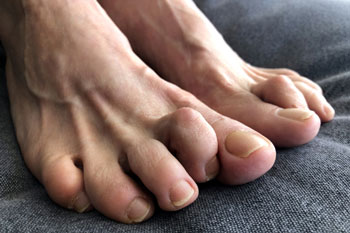
Hammertoes get their name due to the abnormal appearance of the toe, in which it bends down like a hammer. A hammertoe’s shape is formed by a deformed bending in the toe’s middle joint. There are many factors that play into how hammertoes form. Trauma to the toe, such as stubbing, jamming, or breaking it, can make the toe more susceptible to developing into a hammertoe. Age and gender also influence the likelihood of getting a hammertoe. Women have also been known to be more likely to develop a hammertoe compared to men. You’re also more likely to develop this condition as you age. Certain diseases, such as arthritis and diabetes, have been known to influence the likelihood of forming a hammertoe.
Hammertoes can be painful as well as incredibly uncomfortable. To help ease these symptoms, it may be beneficial to wear orthotics. Custom orthotics are used to help realign the toe structure and aid in the process of healing. Certain injections may be recommended by a podiatrist as well to help alleviate the pain. To prevent being afflicted by this condition, it’s recommended that you wear shoes that leave enough room for your toes and continually change your footwear as your feet change in size.
If you’d like more information on hammertoes and how to best treat the condition, we recommend you speak with a podiatrist for professional care and advice.
